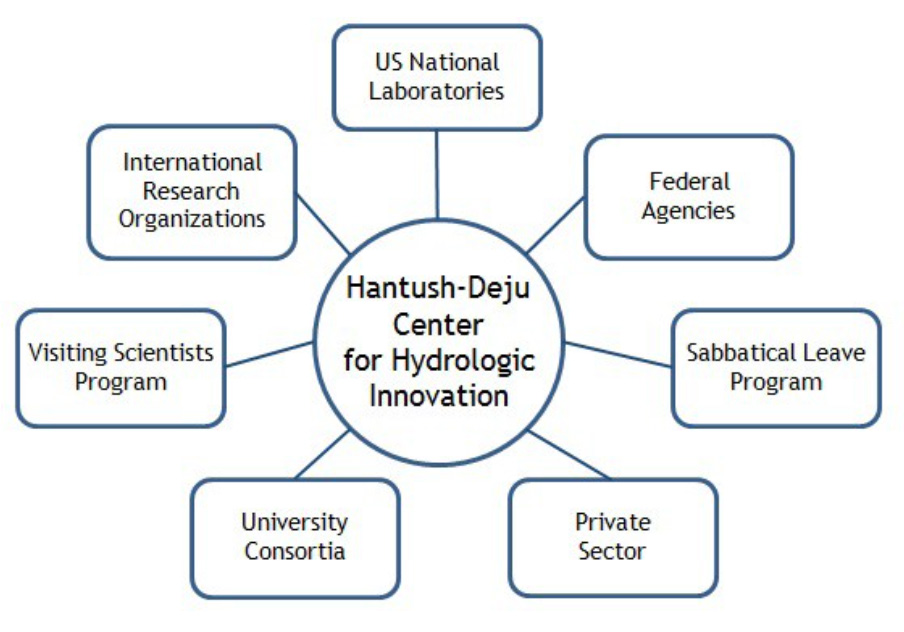
About the Center
The late Dr. Mahdi Hantush founded the hydrology program at New Mexico Tech in 1958 along with C.E. Jacob. This was the first known graduate program in hydrology in the world. Dr. Hantush contributed innovative analytical tools for use to evaluate the characteristics of leaky aquifers and numerous other models. His models found wide practical use throughout the world and are still in use today. Dr. Hantush headed the New Mexico Tech hydrology program until his professor, C.E. Jacob, became the head of the program in the late 1960s. Among the first students of Dr. Hantush was Raul Deju, who earned his doctorate at New Mexico Tech and is now providing a generous endowment to honor the innovative research of his advisor.
The Hantush-Deju Center for Hydrologic Innovation will continue the legacy of the NMT hydrology program and will expand the programs' impact through this research Center for decades to come. The Center will have research focus areas tailored to the strengths of the faculty and responsive to external research drivers. The Center will be flexible in selecting research programs to focus on so it can adapt or expand its research emphasis in response to the water needs in a changing world.
Identifying new sources of fresh water and quantifying the amount of water in storage in our aquifers as well as the changes in storage due to pumping and climate change are key challenges for water managers concerned with sustainability of their undergroundwater resource. The initial area of emphasis for the Center will help us better understand the infrastructure of our aquifers and quantify the components of the groundwater balance at scales ranging from a well field or groundwater basin to the global scale. This innovative research to evaluate water balance components uses remote sensing, global positioning systems, and geodetic measurements to evaluate water flow by measuring small displacements of the earth. Some New Mexico Tech faculty in the hydrology and geophysics programs are already working in these areas and make it an excellent choice for the initial research program at the Center.
Our Vision and Mission
The Center’s vision is to help the world secure a sustainable supply of water for tomorrow. Our mission is to develop a nationally and internationally recognized research program to improve our understanding about our water resources and how water is managed.
External Collaboration

The Center will forge strategic partnerships through collaborations with staff in our national laboratories. National lab hydrologists who have funded projects with overlapping or complementary interests with the Center would be welcome to engage the expertise of the Center’s research staff and graduate students in undertaking their projects in a more cost-effective manner.
The Center, through its staff and affiliated faculty, will seek opportunities to leverage their research efforts though collaboration with other hydrology programs, such as the University of Arizona, the Desert Research Institute, Colorado School of Mines or others to respond to calls for proposals on large scale, long duration, or regional research proposals. Collaboration with international research institutions is also anticipated.
Additionally, the Center will be open to collaboration with industry. For example, consultants or sensor developers who want to conduct proof of concept experiments would be welcome to the Center where, in addition to laboratory facilities, abundant land is available for field experiments, which could be maintained by NMT researchers and graduate students. The Center director would explore developing collaborative industry research partnerships in which companies, public utilities or other organizations sponsor research in exchange for gaining timely access to cutting edge technology.
The Center anticipates in its first year to establish close working ties with centers of excellence in New Mexico such as Los Alamos National Laboratories and Sandia National Labs and key institutions such as Navajo Technical University and the other universities in the state.
Funding
Funding for the Center initially will be seeded by Dr. Stephen Wells’ Presidential endowed research professorship, ongoing State funding, and three annual gifts from Dr. Raul Deju. These funds are needed to grow the center, including support for the Center director, rotating researchers, post-doctoral fellowships, graduate assistantships, supplemental salary support for faculty with joint appointments with the Center, and undergraduate financial aid.
Dr. Raul Deju and his wife, Shari, also have committed to provide a generous endowment to the Institute via their trust. This private funding is essential to achieving the desired national and international status of the Center. Dr. Deju’s gift would expand the hiring of key research positions and provide added laboratory facilities and field equipment to carry out the research objectives of the center. The Center staff would also seek external funding from other philanthropists and from traditional research sponsors of competitive grants such as the National Science Foundation, United States Geological Survey, other federal agencies, as well as from international or state sources.